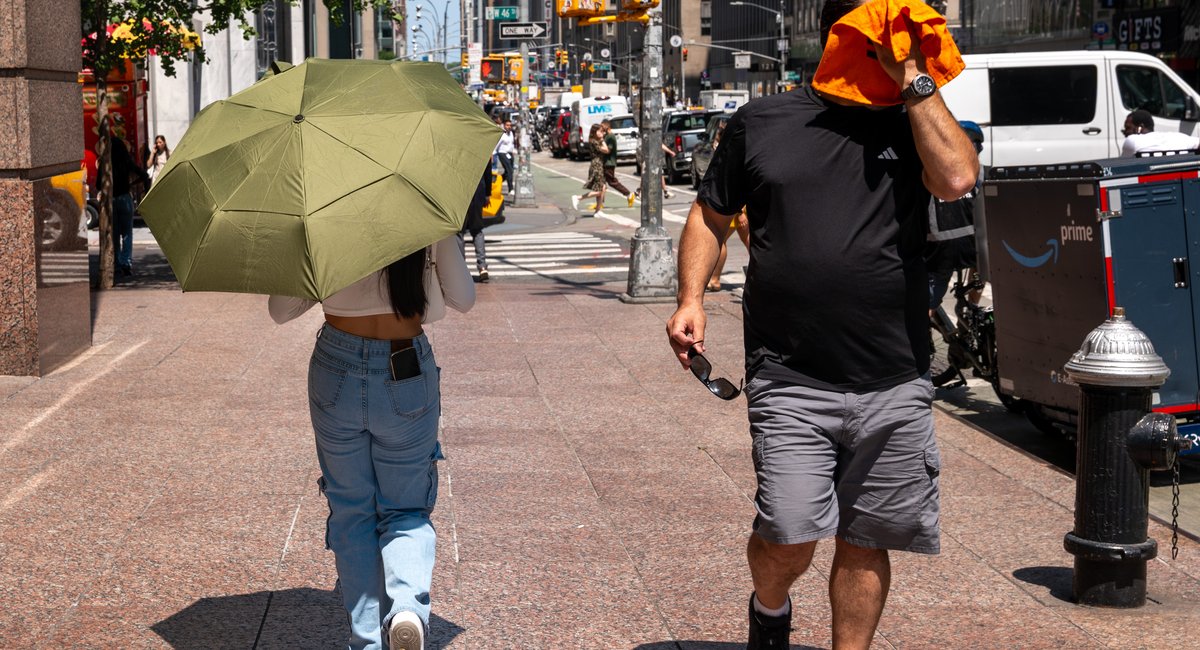Donna Harvey spent some of this summer’s hottest days searching for a place to live.
Beginning July 1, she knew city marshals could show up at her Jamaica home any day to evict her. So, she texted a long list of landlords. She trekked to the Bronx to seek help at a housing intake center. And with her 4-year-old son in tow, she checked into a shelter in Queens that was so sweltering she and her son couldn’t sleep.
“We couldn’t even close our eyes,” she said. “It was just that bad. It was very suffocating.”
Harvey’s experience is not unique. New Yorkers frequently navigate the upheaval of an eviction during the hot summer months. On June 23, when a blazing heat wave was blanketing the city, there were 59 evictions, according to a new report from the nonprofit Legal Services NYC, which represents tenants in housing court. During another heat wave, in early July, a pregnant client of the organization was evicted from her Bronx home when the heat index was nearly 100 degrees, the report said.
Now, Legal Services NYC is urging the city to ban evictions on extremely hot days. The group said kicking people out of their homes in scorching weather can exacerbate the already dangerous effects of extreme heat.
“It’s insufferably hot for all New Yorkers right now. We’ve had a brutally hot summer,” said Carolyn Norton, deputy chief of litigation and advocacy at Legal Services NYC and one of the report’s authors. “Imagine being forced out of your home with nowhere to go on one of the hottest days of the year.”
Spokespeople for Mayor Eric Adams’ office and the city Department of Investigation, which oversees evictions, did not immediately respond to requests for comment.
Legal Services NYC’s report found more than 7,500 New York City tenants and their families have been evicted from their homes on days when it was hotter than 90 degrees since 2017. The report also found a large share of evictions occur in the neighborhoods that are most vulnerable to heat.
Extreme heat can pose more than just an inconvenience during an eviction. More than 500 people die prematurely from heat illness in New York City each year, according to local emergency management officials. That’s about double the number of traffic fatalities last year. It’s also far higher than the 382 recorded cases of homicides and non-negligent manslaughter in 2024, NYPD data shows.
As New York grapples with more frequent extreme heat due to climate change, Legal Services NYC is asking the city to implement a new policy to pause evictions on days when the heat index, or real-feel temperature, is forecast to exceed 90 degrees.
Norton said evictions can be more difficult to maneuver in the heat for various reasons. She said people may exert themselves more while packing up their belongings in a hot apartment. They may also have to brave the heat to travel to housing court or wait in line at an intake center to get into a shelter, she said.
And those who do end up in shelters may not have air conditioning. Gothamist previously reported four in 10 city shelters have no air conditioning in bedrooms.
New York City is filled with areas known as “urban heat islands” that feel especially hot because of a plethora tall buildings and a lack of trees, among other environmental conditions. The city tracks which neighborhoods are most vulnerable to heat based on several factors, including surface temperatures, green space, access to air conditioning and median income.
Legal Services NYC overlaid a map of the neighborhoods most vulnerable to heat with eviction cases, and found nearly two-thirds of evictions between 2017 and 2025 happened in communities that rank highest on the heat-vulnerability index — though not all of those evictions occur on hot days. Jamaica, Donna Harvey’s neighborhood, tends to be one of the hottest, according to city data.
The Department of Investigation sometimes pause evictions on particularly hot days. But Legal Services NYC said the agency should have a formal policy to prevent evictions during extreme heat so New Yorkers facing eviction will know ahead of time that they can stay in their home until the heat wave passes.
Several other places across the country have adopted similar policies. Maryland recently passed a law banning the execution of evictions during extreme weather. Sonoma County, California, bars evictions during official states of emergency. Cook County, Illinois, which includes Chicago, prohibits evictions when it’s extremely cold.
Harvey said dealing with an eviction in the heat created a “domino effect” of stress for her and others she encountered in the shelter system. As she lay in bed in the hot room, she said, she started to have a panic attack.
“ My mental was already in a place of finding adequate housing, stable housing for my child,” she said. “And I get to a place where now I’m even more flustered, because the heat is here.”
Harvey said she didn’t feel comfortable staying in the hot shelter with her son, who has asthma, and went back to her Jamaica apartment. A housing court judge agreed to pause her eviction proceedings while she searched for a new place, after her lawyer submitted evidence that she’d been in touch with a real estate broker and multiple landlords.
Harvey said she’s moving into a new apartment this month with help from her savings and a new part-time job as a home health aid. She’s relieved to be settled and plans to go back to school this fall.
“I needed peace,” Harvey said. “I could probably now get a good night’s sleep because I don’t feel like I’m twisting and turning, thinking about what are the next steps.”
